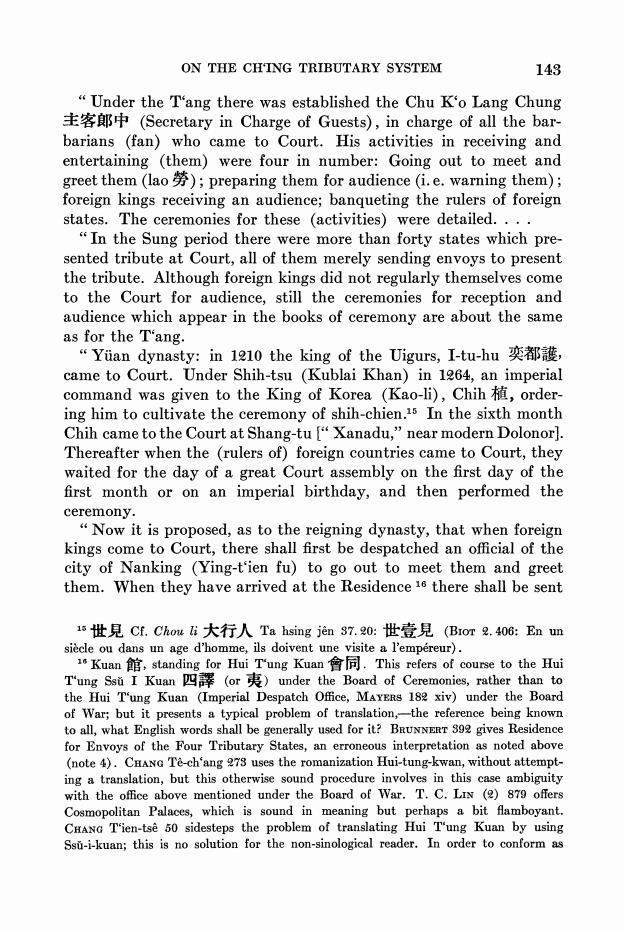正在加载图片...

ON THE CHING TRIBUTARY SYSTEM 143 "Under the T'ang there was established the Chu K'o Lang Chung 主客郎中(Secretary in Charge of Guests),in charge of all the bar- barians (fan)who came to Court.His activities in receiving and entertaining (them)were four in number:Going out to meet and greet them(lao);preparing them for audience (i.e.warning them); foreign kings receiving an audience;banqueting the rulers of foreign states.The ceremonies for these (activities)were detailed.... "In the Sung period there were more than forty states which pre- sented tribute at Court,all of them merely sending envoys to present the tribute.Although foreign kings did not regularly themselves come to the Court for audience,still the ceremonies for reception and audience which appear in the books of ceremony are about the same as for the T‘ang. “Yiian dynasty:inl210 the king of the Uigurs,.I-tu-hu奕都護, came to Court.Under Shih-tsu (Kublai Khan)in 1264,an imperial command was given to the King of Korea (Kao-li),Chih,order- ing him to cultivate the ceremony of shih-chien.15 In the sixth month Chih came to the Court at Shang-tu ["Xanadu,"near modern Dolonor]. Thereafter when the (rulers of)foreign countries came to Court,they waited for the day of a great Court assembly on the first day of the first month or on an imperial birthday,and then performed the ceremony. "Now it is proposed,as to the reigning dynasty,that when foreign kings come to Court,there shall first be despatched an official of the city of Nanking (Ying-t'ien fu)to go out to meet them and greet them.When they have arrived at the Residence 16 there shall be sent 1s世見Cf.Chou li大行人Ta hsing jen87.0:世壹見(Bor2.406:Enun siecle ou dans un age d'homme,ils doivent une visite a l'empereur). i“Kuan館,standing for Hui T'ung Kuan會同,This refers of course to the Hui T'ung SsǚI Kuan四a譯(or夷)under the Board of Ceremonies,rather than to the Hui T'ung Kuan (Imperial Despatch Office,MAYERs 182 xiv)under the Board of War;but it presents a typical problem of translation,the reference being known to all,what English words shall be generally used for it?BRUNNERT 392 gives Residence for Envoys of the Four Tributary States,an erroneous interpretation as noted above (note 4).CHANG Te-ch'ang 273 uses the romanization Hui-tung-kwan,without attempt- ing a translation,but this otherwise sound procedure involves in this case ambiguity with the office above mentioned under the Board of War.T.C.LIN (2)879 offers Cosmopolitan Palaces,which is sound in meaning but perhaps a bit flamboyant. CHANG T'ien-tse 50 sidesteps the problem of translating Hui T'ung Kuan by using Ssu-i-kuan;this is no solution for the non-sinological reader.In order to conform asON THE CH'ING TRIBUTARY SYSTEM 143 "Under the T'ang there was established the Chu K'o Lang Chung *MFJW+r- (Secretary in Charge of Guests), in charge of all the barbarians (fan) who came to Court. His activities in receiving and entertaining (them) were four in number: Going out to meet and greet them (lao A); preparing them for audience (i. e. warning them); foreign kings receiving an audience; banqueting the rulers of foreign states. The ceremonies for these (activities) were detailed.... " In the Sung period there were more than forty states which presented tribute at Court, all of them merely sending envoys to present the tribute. Although foreign kings did not regularly themselves come to the Court for audience, still the ceremonies for reception and audience which appear in the books of ceremony are about the same as for the T'ang. " Yuan dynasty: in 1210 the king of the Uigurs, I-tu-hu 1Z't, came to Court. Under Shih-tsu (Kublai Khan) in 1264, an imperial command was given to the King of Korea (Kao-li), Chih A, ordering him to cultivate the ceremony of shih-chien.15 In the sixth month Chih came to the Court at Shang-tu [" Xanadu," near modern Dolonor]. Thereafter when the (rulers of) foreign countries came to Court, they waited for the day of a great Court assembly on the first day of the first month or on an imperial birthday, and then performed the ceremony. " Now it is proposed, as to the reigning dynasty, that when foreign kings come to Court, there shall first be despatched an official of the city of Nanking (Ying-t'ien fu) to go out to meet them and greet them. When they have arrived at the Residence 16 there shall be sent 16 IQ Cf. Chou 1i )Z JitA Ta hsing jen 37. 20: iJ. (BIOT 2. 406: En un sicle ou dans un age d'homme, ils doivent une visite a 1'empereur). 18 Kuan UV, standing for Hui T'ung Kuan * MP. This refers of course to the Hui T'ung Ssii I Kuan V9X (or 4) under the Board of Ceremonies, rather than to the Hui T'ung Kuan (Imperial Despatch Office, MAYERS 182 xiv) under the Board of War; but it presents a typical problem of translation,-the reference being known to all, what English words shall be generally used for it? BRUNNERT 392 gives Residence for Envoys of the Four Tributary States, an erroneous interpretation as noted above (note 4). CHANG T6-ch'ang 273 uses the romanization Hui-tung-kwan, without attempting a translation, but this otherwise sound procedure involves in this case ambiguity with the office above mentioned under the Board of War. T. C. LIN (2) 879 offers Cosmopolitan Palaces, which is sound in meaning but perhaps a bit flamboyant. CHANG T'ien-tse 50 sidesteps the problem of translating Hui T'ung Kuan by using Ssfi-i-kuan; this is no solution for the non-sinological reader. In order to conform as